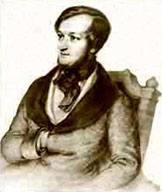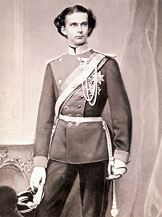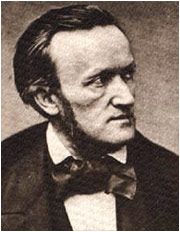|
The
greatest composer of German opera, Richard Wagner, b. Leipzig,
May 22, 1813, was the youngest of nine children of Friedrich
and Johanna Wagner. His father, a police registrar, died 6
months after Wagner was born, and his mother was remarried
the following year to Ludwig Geyer, an actor and portrait
painter, who moved the family to Dresden.
Geyer
died in 1821, and in 1827 the family returned to Leipzig.
Wagner was attracted to the theatre at an early age.
 His
formal music training was brief - about 6 months in 1831-32 with
the Leipzig cantor C.T. Weinlig. During the 1830s, Wagner held
a series of conducting posts with small theatrical companies, and
he wrote two operas, Die Feen (The Fairies, 1834) and Das
Liebesverbot (Forbidden Love; after Shakespeare's Measure for
Measure); His third opera, Rienzi, was conceived on a larger
scale, and Wagner travelled to Paris in 1839 with the futile hope
of having it performed there. Rienzi was finally accepted for performance
in Dresden in 1842. Its success, coupled with that of Der fliegende
Holländer (The Flying Dutchman) the following year, led
to Wagner's appointment to an official conducting post in Dresden.
His
formal music training was brief - about 6 months in 1831-32 with
the Leipzig cantor C.T. Weinlig. During the 1830s, Wagner held
a series of conducting posts with small theatrical companies, and
he wrote two operas, Die Feen (The Fairies, 1834) and Das
Liebesverbot (Forbidden Love; after Shakespeare's Measure for
Measure); His third opera, Rienzi, was conceived on a larger
scale, and Wagner travelled to Paris in 1839 with the futile hope
of having it performed there. Rienzi was finally accepted for performance
in Dresden in 1842. Its success, coupled with that of Der fliegende
Holländer (The Flying Dutchman) the following year, led
to Wagner's appointment to an official conducting post in Dresden.
There
he completed Tannhäuser (1845) and Lohengrin
(1848). This period of success ended in 1849, however, when his
participation in revolutionary political activities forced him to
flee to Switzerland. Wagner's exile from Germany, which lasted until
1860, marks the start of a new period in his career.
 Wagner
began composing the non-conventional opera-cycle Der Ring des
Nibelungen (THE RING OF THE NIBELUNG) in 1848 and did not finish
until 1874.
Wagner
began composing the non-conventional opera-cycle Der Ring des
Nibelungen (THE RING OF THE NIBELUNG) in 1848 and did not finish
until 1874.
The
last great turning point in Wagner's fortunes occurred in
1864 when he was called to Munich by the eccentric young king
of Bavaria, Ludwig II, an ardent admirer of his works and
theories. Ludwig's patronage continued for the last 20 years
of Wagner's life, making possible the performance of all his
mature works and eventually the construction in Bayreuth of
a theatre of Wagner's own design. It was opened in 1876 with
the first complete production of the Ring. Bayreuth soon became
the centre for the promotion of Wagner's works and ideology.
His last opera, Parsifal, was performed in 1882, with
the ceremony normally accorded only to a religious event.
Following
Wagner's death on Feb. 13, 1883, control of the Bayreuth festival
passed to his second wife, Cosima (a daughter of Franz Liszt), and
later to their children and grandchildren, a succession that has
continued to the present.
|









